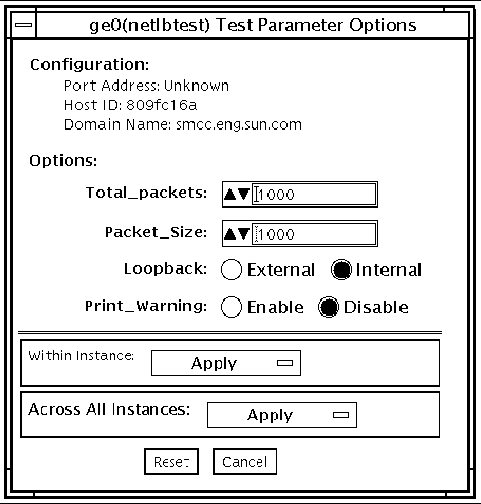| C H A P T E R 39 |
Ethernet Loopback Test (netlbtest) |
The netlbtest replaces the gemtest previously included in SunVTS. It provides functional test coverage of the devices which have device drivers that support the Ethernet loopback test. These devices include eri (the Ethernet device in the RIO chip) and ge (Gigabit Ethernet), and ce (GigaSwift Ethernet). The netlbtest runs in loopback (external/internal) mode.
The netlbtest uses DLPI RAW mode to talk to the device driver. For the purpose of this test, a packet is defined as an Ethernet header followed by the Ethernet data payload (refer to the IEEE 802.3z standard). The test generates and sends out the desired number of packets (a tunable parameter) and expects to receive the same number of packets through the loopback interface, external or internal. If an error occurs (for example, packet mismatch or timeout), an error message indicating the type of error, its probable cause(s), and recommended action(s) is displayed on the SunVTS console.The data sent out is generated by a random number generator, and put into a data buffer. Each time a packet is sent, it is selected from a different starting point of the data buffer, so that any two consecutively transmitted packets will not be the same.
|
Note - Do not run nettest and netlbtest at the same time or the tests may fail. |
You must have the Ethernet card and the device driver installed, a loopback connector in place, and Intervention mode enabled before running netlbtest . netlbtest cannot run if the network interface is connected to a live network, and requires that the ethernet device be configured offline before running the test. Use the ifconfig(1M) command to bring the Ethernet device down before running netlbtest . Enter the following commands to bring the interface down:
To run netlbtest , a loopback connector must be connected to the Ethernet interface. A loopback connector provides the network interface driver the necessary link for testing, while maintaining isolation from a live network. The loopback connector is required for both internal and external tests of the Ethernet device.
The loopback cable for ge and Sun GigaSwift Ethernet MMF adapter ( ce fiber) is based on the following specifications: multimode, duplex, 62.5/125 micron, sc connector, 850nm. The cable can be made by splitting a standard fiber optic cable in two. The two ends of the cable should be connected to the TX and RX ports of the adapter (the order does not matter), thus forming a loop.
The loopback connector for the eri device is a standard RJ-45 connector. See Twisted-Pair Ethernet (TPE) Loopback Cable For Fast Ethernet for the diagram. The loopback connector for a Sun GigaSwift Ethernet UTP adapter ( ce copper) is a standard RJ-45 with all 8 pins connected. See TPE Loopback Cable For Gigabit Ethernet for the diagram.
To reach the dialog box below, right-click on the test name in the System Map and select Test Parameter Options. If you do not see this test in the System Map, you might need to expand the collapsed groups, or your system may not include the device appropriate to this test. Refer to the SunVTS User's Guide for more details.

Refer to for test parameter descriptions.
|
Runs the full set of subtests. It is assumed that the host is not connected to the network through the intended test device(s). |
Since netlbtest requires a loopback connector, it can only be selected when Intervention mode is enabled.
/opt/SUNWvts/bin/netlbtest standard_arguments -o dev= device ,tpkts= n ,pksz= pkt_size ,lb= Internal ,warn= Disable
|
Note Note - 64-bit tests are located in the sparcv9 subdirectory: /opt/SUNWvts/bin/sparcv9/testname. If a test is not present in this directory, then it may only be available as a 32-bit test. For more information refer to 32-Bit and 64-Bit Tests. |
Copyright © 2002, Sun Microsystems, Inc. All rights reserved.